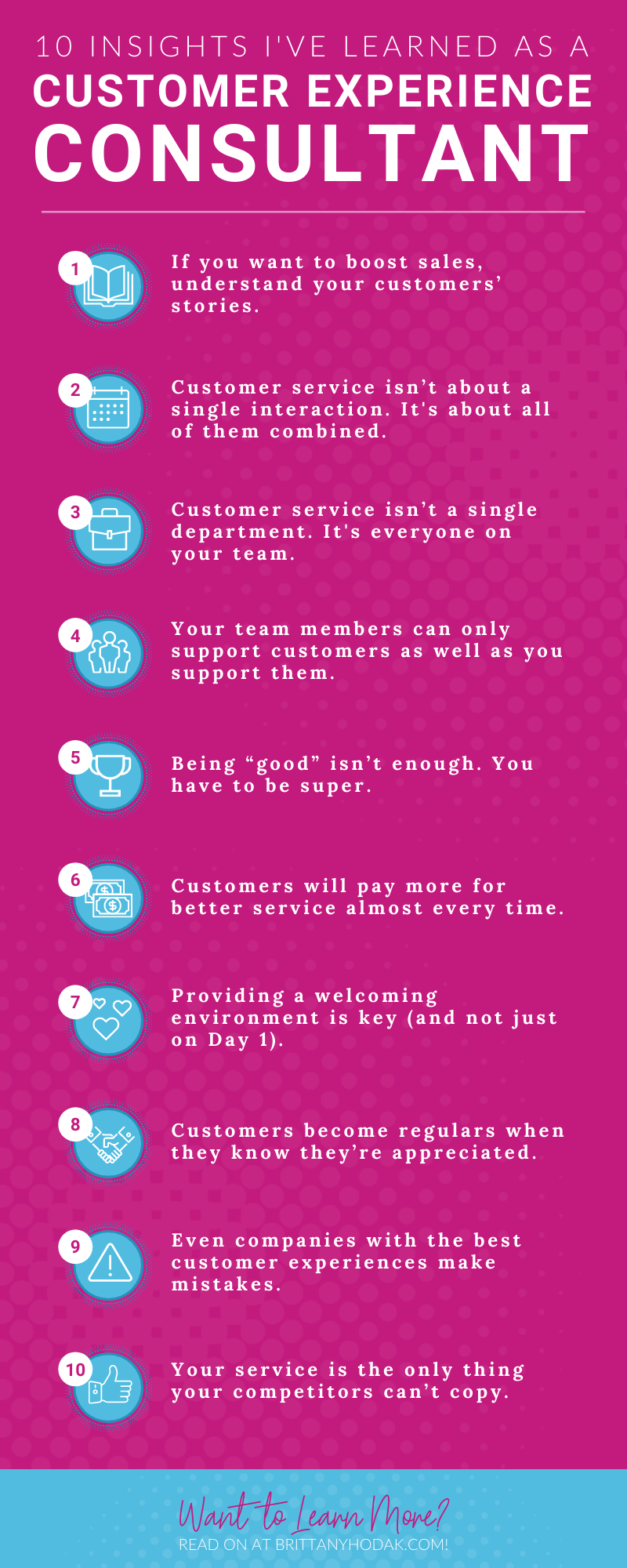A customer experience consultant is someone who specializes in the customer journey from start to finish. Through my time working with countless companies across industries, I’ve gathered my fair share of noteworthy insights.
With 96% of customers saying the overall service is the most important thing in their decision to be loyal to a brand, customer experience (CX) has never mattered more. It’s simple math—the brands that focus on customer service and experience are the ones that reduce churn and increase revenue.
One of the biggest questions I get asked as a customer experience consultant is what are the most important things I’ve learned. In this guide, I’m summing up 10 insights I’ve learned by working with brands on their customer experience.
If you want to boost sales, understand your customers’ stories.
First, if you want to increase your sales, you need to know who you’re marketing to. Too many companies jump straight to strategy when they don’t have a strong foundation.
There’s a scene in Lewis Carroll’s Alice in Wonderland that sums this up. Alice asks the Cheshire cat which way to go. “That depends a good deal on where you want to get to,” he responds. Alice says she doesn’t care. The cat grins his famous smile. “Then it doesn’t matter which way you go.”
Carroll was onto something with this interaction. Alice is in a rush to go somewhere, and as a result, she gets nowhere. That’s dandy if you’re in Wonderland, but it’s not exactly a winning strategy in the real world.
If you want clear directions, it’s up to you to know where you’re going. Your customers’ stories, needs, challenges, and so on should be at the foundation of your strategy. Only once you have an in-depth understanding of your customer persona do you know what directions to ask for.
Customer service isn’t about a single interaction.
Next, too many businesses fixate on small details. They hyper-focus on their social media responses, their feedback, or their support tickets. While these are all important elements, they’re just a part of the bigger picture.
Focus on the whole customer journey, from pre to post-purchase. No single interaction is more important than the next. Let’s break away from the single-interaction thinking. While small moments with customers matter, if you want to create superfans, you need to look at the bigger picture.
Customer service isn’t a single department.
Third, while customer service agents are on the front lines of customer interactions, they’re not alone in their fight. The barriers between customer service and all of your other departments need to come down.
Customers can (and will) interact with anyone on your team. From tech support to social media, each of these small interactions matters to your users. Everyone across each team should be empowered with the skills to provide outstanding service.
For example, look at the electric car manufacturer Tesla. They understand that customer service doesn’t just belong to the support team. With both in-person and mobile service centers, they quite literally bring high-level service to customers. This hard work paid off, and Tesla is the top brand in Consumer Report’s owner satisfaction survey.
Your team members can only support customers as well as you support them.
Your team members need the right tools to create customer service magic. This means creating clear protocols and policies with service in mind. In other words, your team needs to be empowered to not only care for themselves but also the customers they work with every day.
One shining example of this is the Walt Disney World resort. From the first day as an employee, Disney trains cast members in the importance of creating magical moments for guests. At in-park locations, cast members are given special cards to create these moments for guests, either to turn around a negative situation or make a lifelong memory.
From free ice cream to skipping the line, cast members are encouraged to go above and beyond when they feel like it’s appropriate. These special moments not only make lifelong superfans, but they also improve employee satisfaction.
Being “good” isn’t enough. You have to be super.
Why settle when you can be the best? Just because your strategy was good enough a few years ago doesn’t mean it’s functional now. You have to be exceptional if you want to attract superfans.
Publix, a grocery store chain, puts the super in supermarkets. As of October 2020, Newsweek named Publix the number 1 in America for customer service. The founder of Publix had the right strategy from the start. He said it best, “First, take care of your customers. Second, take care of your associates. They will in turn take care of your customers.”
While it might sound simple, creating a company culture that lifts employees has been vital in Publix’s status as the best place to shop for groceries. These stores go above and beyond the typical supermarket to form real connections with both customers and employees.
Customers will pay more for better service.
Did you know that 86% of buyers will pay more for a great customer experience? It’s true, and you’ve probably paid a premium for service without even noticing. Regardless of industry, people understand that they get what they pay for.
A prime example of this is Apple, a brand that’s priced so high it’s coined the term “Apple Tax.” Apple products aren’t necessarily better performing than other comparable brands, but there’s a special recognition to the brand name.
Apple customers have come to expect a high level of customer service and care with staying loyal to Apple, so it’s easy to see why this brand still reigns supreme in the tech space. This brand loyalty wasn’t earned easily, but it’s real and lasting.
Providing a welcoming environment is key (and not just on Day 1).
Your business might offer a welcoming environment on day 1, but what about on day 100? You need to attract customers with a warm, welcoming embrace not only with the first interaction but also with the last.
It’s all about making your customers feel welcome. How do you do this?
- Welcome strategy: Have a clear plan for bringing customers into your brand.
- Stay personal: Always personalize your interactions with your customers, whether you’re sending an email, greeting them in-person, or following up.
- Say “Thank You:” Saying “thank you” after each interaction sounds simple, but it makes a warm impression.
- Be transparent: Customers value transparency in the businesses they support. Be open and honest about your policies, fees, and so on.
These steps above are a must from day 1 as well as day 100 (and beyond). Build them into your regular strategy to create lasting connections.
Customers become regulars when they know they’re appreciated.
Next, consider your own personal relationships. If you had a friend who was always asking you for money, never picked up the phone, and always left you feeling drained, you probably wouldn’t be their friend for long.
The same is true of your customer relationships. You need to make your customers feel appreciated with each interaction, especially your loyal customers. There are so many ways to make your customers feel understood, from asking for feedback to improving the overall customer experience.
One example of a brand that rewards regulars is Sephora. The makeup retailer started its Beauty Insider rewards program to retain existing customers. Signing up for the program is free, and customers earn “points” with each purchase. Better yet, they also gift customers a freebie on their birthday and during promotional events. This makes each customer feel special.
Even companies with the best customer experiences make mistakes.
Albert Einstein said it best: “Anyone who has never made a mistake has never tried anything new.” Even if you have the most comprehensive customer service strategy, mistakes will happen. Instead of seeing these as a negative, see them as a chance to right your wrongs.
It doesn’t matter that you made a mistake. It matters that you apologize, validate your customers’ concerns, solve the immediate problem, and create a plan so this issue doesn’t happen again.
The best way to lessen your fear of mistakes is to create a clear strategy for when it happens (because it will). Having a straightforward process for your team to follow when things don’t go according to plan makes sure you never skip a beat.
Your service is the only thing your competitors can’t copy.
Finally, it’s important to recognize that your customer service is uniquely your own. Your competitors can have the same product, but it’s your service that helps you stand out at the end of the day.
To see how service positions one brand over the others, look at the world of music streaming. Spotify is one of the leading streaming providers, but they don’t offer anything groundbreaking in terms of their application. However, it’s their @SpotifyCares social media presence that stands out.
Not only did this brand win a Webby Award for customer service, but they also make it simpler than any other streaming service to get the help you need fast. It’s simple, but this sets Spotify apart from Apple Music, Pandora, Amazon Music, and so on.
Harness the Power of a Customer Experience Consultant
My work as a customer experience consultant uniquely positions me to breathe fresh perspectives into the companies I work with. No company exists in a vacuum, and it’s important to stay competitive with your customer service strategy.
Ultimately, there’s always work to be done, but the first step is always closer than you think. Ready to turn around your customer service? Let’s chat!

